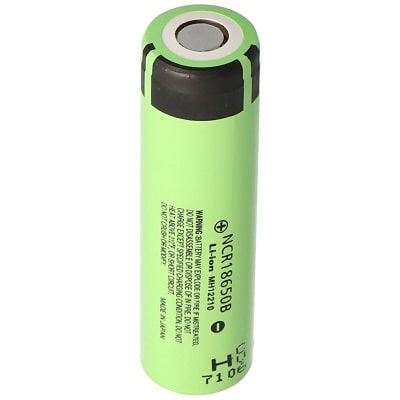The Li-ion battery has many advantages. It is light, has a higher energy density and a very low self-discharge. But this chemistry also has its disadvantages. The experts at Elfa recommend.
Lithium is the lightest of all metals, with a large electrochemical potential and the greatest energy density. The anode of a lithium ion battery contains lithium ions dissolved in carbon. The cathode is formed by lithium oxide with cobalt or manganese. The electrolyte consists of lithium salt. Li-ion (and Lithium polymer) are leading battery technologies and are often used in portable applications because of their extremely high energy density and relatively low weight. Li-ion can be recognized by its cylindrical cells and lithium polymer by its prismatic shape.
A lithium-ion battery delivers the same or even more energy than a NiMH battery, although a lithium-ion variant weighs approximately 20% -35% less. This is an important advantage for devices where the battery is a significant part of the total weight. Another reason why a lithium-ion battery is so popular is because this type of battery does not suffer from the ‘memory effect’. The batteries are also environmentally friendly as they do not contain any toxic substances such as cadmium or mercury.
The battery can hold more charge than the NiCd and NiMH battery. Per kilogram of battery, the Li-ion battery can store the greatest amount of energy (140 Wh/kg). In the laboratory this variant can also be charged much more frequently in a test set-up. A more expensive polymer construction has even better properties. In particular, the power density is much higher. This means that a lot of energy can be delivered in a short time. Below is an example of this type of battery.
Elfa offers a wide range of lithium-ion batteries and accumulators suitable for various applications. We also have ‘standard’ Li-ion packs with UN certification. One of the brands we offer lithium-ion batteries from is Panasonic. For example, we have a li-ion battery that has a high energy density and a long service life. It is a powerful battery without safety wiring with a temperature range of -20 to +60 °C.

Panasonic Li-ion batt 3,6V 3400mAh NCR18650B
When a Li-ion battery is charged, a constant current and voltage (CV-CC) is used. During charging, the voltage rises to 4.2V (or 4.2V per cell in series).
The charging time is usually 2-4 hours. How long it takes exactly, depends on battery status and temperature. The ideal charging current is 0.7 CmA, depending on the battery capacity (e.g. 1400 mA for a 2A cell).
When the voltage per cell drops below 3.0V, it is recommended to reduce the charge current to 0.1 CmA. The discharge current should not exceed 1 CmA and the voltage should not fall below 2.9V.

Eric van de Laar
Sales & Business Unit Manager
Do you have a question?
Feel free to email or call me!
So besides the various advantages, there are also disadvantages to lithium-ion batteries. These include a number of vulnerabilities. There is, in fact, a risk that due to it’s chemical composition, they self combust in the event of a defect. Oxygen is also released, which can cause serious flames. But when the original charger is used for its intended purpose, the risk of damage is very small.
Another (less known) disadvantage is that the battery already starts to lose its capacity immediately after it has been manufactured. At 25 degrees Celsius this is about 20% per year. At higher temperatures this percentage increases even more. Because of this chemical decay a laptop battery for example will only last 3 to 5 years.
In addition to standard Li-ion batteries, Elfa also offers customised Li-ion battery packs. We offer this option when regular batteries are not sufficient for the application in question. The situation may arise that a certain type of battery is no longer available. In that case, Elfa produces its own lithium-ion battery pack that fully meet the customer’s wishes and requirements.
These custom-made solutions are assembled in our own production facility and are tailored to your requirements, looking at dimensions, voltage, capacity, connector and even sealing. At Elfa, a Li-ion battery pack can be assembled for brands such as Saft, Tadiran, Panasonic and Varta.
Within a Li-ion pack there is always a safety circuit that consists of three components:
Good to know, is that our lithium-ion battery packs are UN-certified, which guarantees worry-free transport. In fact, a UN transport certificate is required for transport when battery packs are connected in series or parallel, as the mechanical composition must be strong enough to make transport trouble-free. Contact us if you have any questions about our Li-ion packs!
Do you have any questions about our range of lithium-ion batteries? Don’t hesitate to contact us. Our experts will be happy to advise you and answer your questions. The easiest way is to fill in the contact form below.